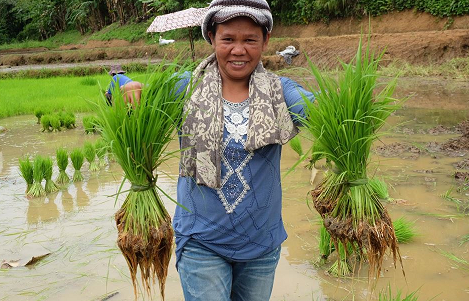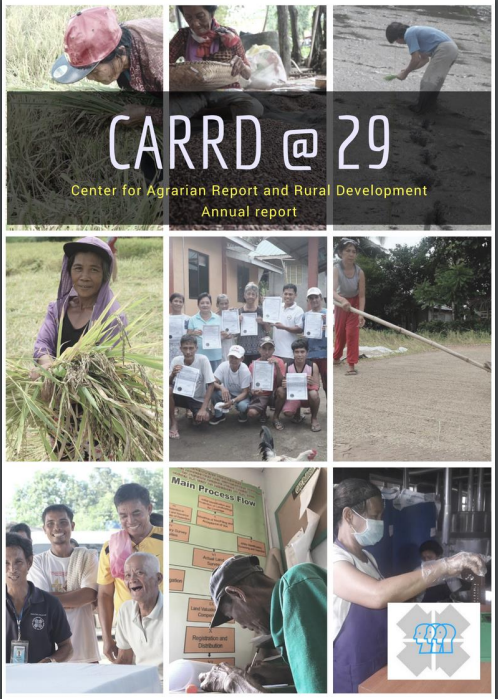
Farmers in Barangay Salngan, Iloilo have been practicing organic farming since the 1990s. The approach worked for them. The lightest drizzle made the community inaccessible to the city centre, which means they have limited access to commercial inputs. A farmer has to pay PHP 200 to cart goods to the city, a price too large for the little amount they get selling their produce.
These farmers were trained by MASIPAG, or Magsasaka at Siyentipiko para sa pag-unlad ng Agrikultura. A pioneer non-government organization (NGO) in sustainable agriculture, MASIPAG introduced other traditional upland rice varieties and sustainable agriculture practices. They taught farmers to breed their own varieties and not rely on commercially available varieties for food production.But while the support helped in daily subsistence, farm-to-market
inaccessibility and the absence of proper facilities prevented them from
earning income from rice production. Their black and red rice were “no name”
rice and were of inferior quality. In the absence of a devoted facility for
organic produce, they processed their harvested palay through a kono or
portable rice mill. The kono produced broken, small grains, which did not sell.
Partners for
development
Center for Agrarian Reform and Rural Development (CARRD) entered the
picture in 2004, when it provided land tenure assistance to farm workers in the
communities. CARRD worked with Salngan Agrarian Reform Beneficiaries
Multi-Purpose Cooperative (SARBMPC) to provide continued support to agrarian
reform beneficiaries through facilitating farm support services. Using some of
CARRD’s internal funding and with support from the Japan Embassy and Department
of Agriculture, CARRD facilitated the construction of infrastructure necessary
to help farmers increase their productivity. Among these are solar and
mechanical dryers and a dedicated milling facility. Farmers stopped relying on
konos and produced better milled black and red rice.
But it was not until 2010 when the idea of scaling up for commercial
purposes gained traction. With the passage of Organic Agriculture Act of 2010,
an opportunity to expand organic farm production and explore its market
potentials was opened. CARRD worked with then-Philippine Development Assistance
Program (PDAP) to establish internal control systems for the organic rice value
chain – a prerequisite for organic certification.
These initiatives strengthened efforts to preserve local farming
processes. With continued support from Japan’s Asian Community Trust and DA,
SARB-MPC and CARRD expanded to adjacent barangays. Salngan was a case, and
surrounding communities learned from Salngan’s examples. Later, “Katilingban
sang mga Agraryo Padulong sa Pag-Uswag sang Iloilo – Agrarian Reform
Beneficiaries Multi-Purpose Cooperative” (KASAPPI-ARC) a municipal
cooperative was organized to include farmers outside Salngan.
KASAPPI-ARC and CARRD lobbied with local government units (LGUs) for the
building of a farm-to-market road. With support from the DA, a paved road was
built in 2015. Since then, KASAPPI has supplied organic rice to the city centre
and mainstream markets. Global Organic and Wellness Corporation (GlowCorp), a
marketing consortium founded by people’s and NGOs, provided assistance on
product development and marketing. The “no name” rice has gradually penetrated
the Metro Manila under GlowCorp’s “Prime Organics” brand.
Challenges in obtaining organic certification
Perhaps the hardest
challenge is ensuring that every farm in participating communities meet the
rigorous standards of the Organic Certification Center of the Philippines.
Certification was
difficult to obtain for small landholdings because of the huge cost in monitoring.
CARRD trained local farmers to conduct field inspections. In this way, communities
learn quality assurance, and save the cost of hiring farm inspectors. Each farmer-inspector
monitors a number of farms and maintains a record of their farm plan to ensure
that they're keeping within organic certification standards.
Today
The farmers have come a long way. Although not without challenges, they are now
capable of transacting business with other partners with minimal help from
CARRD. Participatory approaches enabled the farmers to determine their needs
and make the best decisions to improve their situation. CARRD and KASAPPI also
partnered with the local radio station to air weekly radio programs on farm-related
topics. In this way, knowledge about organic farming spreads to other farmers
outside of CARRD’s service areas.
Today, farmers are now capable of dealing with the whole value chain instead of
just focusing on production. There is value in co-creation, and there can never
be one technical solution for a challenge that calls for collective, adaptive
work.



